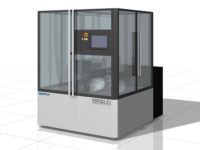When it comes to food packaging, there is growing demand for solutions that are not only flexible, but more importantly, bio-based, recyclable and biodegradable. For years, polyvinyl alcohol (PVOH) has been used in the manufacturing process to strengthen the packaging’s materials and enhance its brightness. But, because of its strong film-forming capability, a new movement is taking place to expand PVOH’s use as a coated, high-barrier paper for the protective packaging of food.
Through products such as Kuraray Exceval, this modified PVOH technology can serve as a protective film against the elements the food packaging industry fears most: grease, oil and gas permeation. This technical advancement addresses consumer demands for biodegradable and recyclable packaging that protects food quality, while minimizing food spoilage and waste.
What is PVOH?
PVOH is a soluble polymer powder that dissolves into water to create a viscous transparent solution. In addition to fortifying the package, it also serves as the carrier for pigments and optical brighteners. As mentioned above, it can resist oil, grease and gas (i.e., oxygen, nitrogen).
Then, there is PVOH’s good film-forming capability, which decreases the paper’s porosity. The best film forming and barrier performance are commonly achieved using partially hydrolyzed PVOH grades with less moisture resistance. As a result, customers often choose fully hydrolyzed PVOH for their superior moisture resistance, even though thicker coatings or multi-layer structures must be used to achieve sufficient barrier performance. These limitations caused Kuraray to take action and develop a patented enhancement to the barrier, water-resistance and film-forming characteristics of PVOH … Kuraray Exceval.
Taking Barrier Protection to the Next Level
Exceval is a vinyl-alcohol copolymerization of a hydrophobic chemical group (ethylene) into a PVOH molecular chain. While chemically similar to traditional PVOH, Exceval has special properties that make it more attractive, including water resistance and enhancing film-forming capability. The ethylene in the molecular chain makes Exceval more flexible and forms better film coverage than regular PVOH. This modification also improves the oxygen barrier relative to conventional PVOH at 50 to 70 percent relative humidity due to its lower moisture sensitivity. Plus, Exceval can contain carbon dioxide and nitrogen environments, which in the food packaging industry, helps preserve the aroma and flavor of dry consumables.
Exceval is also highly resistant to grease and oil, and is approved for food contact by the Federal Drug Administration (FDA). Having FDA approval makes Exceval especially appealing for the packaging of dry food products including coffee and tea, dried nuts and fruits, milk powder, freshly prepared foods (i.e., sandwiches and pizza), snacks, cookies and muffins, herbs and spices, and pet food.
Addressing Market Demand
With a high-quality, flexible, PVOH-coated package, the consumer simply tears or peels back a sheet to access the food. No exorbitant strength or appliance needed. PVOH coatings also offer enhanced visibility of the food product. If given the choice between a tin can or a glass jar, consumers more often choose a glass jar because they can see the food. By using a package with a plastic window treated with a product such as Exceval, not only does the consumer get to see the product, but it is lighter in weight, which translates into lower transportation costs in relation to fuel usage. In short, Exceval helps companies save money.
But, the most pressing trend facing the market is sustainability. Companies need products to have longer shelf lives to decrease the likelihood of food spoilage and to decrease waste. There is also energy savings associated with less refrigeration for shelf-stable foods. Use of Exceval has proven to have one of the highest barriers to oxygen of all plastics and polymers. It slows down food decomposition by isolating the food from oxygen. This allows an extended shelf life without refrigeration. Not only does this impact products in grocery and convenience stores, for example, but also becomes a benefit when providing food products to third-world countries lacking refrigeration or infrastructure.
Exceval Debuts in the US
Kuraray has produced Exceval for more than 10 years in Japan. However, with the upcoming opening of a new plant in Houston, Exceval will soon make its production debut in the United States. Having this modified PVOH available in North America offers numerous benefits to customers, including ease of logistics in using a local supplier with the ability to second-source from overseas.
Kuraray America Inc.
www.kuraray.us.com








